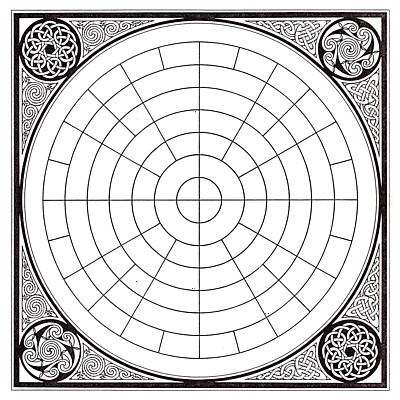
Long ago the ancient Celts played board games not dissimilar to the game that preceded modern chess. There is some scant evidence for what these games were like. Literature and oral tales taken down had interesting references as well: gwyddbwyll and fidchell are mentioned.
Roughly translated, gwyddbwyll, or fidchell (pronounced fickle) in Irish, means "wood wisdom" or "wood sense".
The graphic above is author Nigel Suckling's imaginative version of what a fidchell board might have looked like ... His essay on the origins of fidchell can be read over here. Suckling also outlines some rules by which fidchell can be played using this board.
In one of the few remaining texts for insular Celtic prose mythology, The Mabinogion provides us with a Star Wars like image of gwyddbwyll pieces that come to life and move by themselves like the holograms in the Millennium Falcon. We also have this piece ...
Peredur came to the castle, and the castle gate was open. And when he reached the hall the door was open, and when he went inside he saw a gaming board in the hall, and either of the two sets of pieces was playing against the other, and the one to which he gave his help began to lose the game. And the other side gave a shout, just as if they had been men. Then he grew angry and took the set of pieces on his lap and threw the board in the lake.
The quote comes from 'The Magic Gaming Board' whose 12th century Welsh author is unknown. Bad sportsmanship, it seems, is timeless.
There are also fascinating models of boards in which all the pieces other than the king move like modern rooks. Here is one such board ...
 However, there is no certain version of a fidchell or gwyddbwyll board in existence. In 1932, the Ballinderry Game Board was found, near Ballinderry, West Meath in Ireland, and it is surmised that this is a fidchell board. (See below for a photograph of this board.)
However, there is no certain version of a fidchell or gwyddbwyll board in existence. In 1932, the Ballinderry Game Board was found, near Ballinderry, West Meath in Ireland, and it is surmised that this is a fidchell board. (See below for a photograph of this board.)With the coming of Christianity to the British Isles, all things associated with Druids and Druidism were suppressed, especially cultural practices like fidchell or gwyddbwyll. For what we would today describe as a board game, even a game as great as chess, the Celts viewed as divination, or perhaps a portal to another world, or as prophesy of what was yet to be.
Although the Celtic Christian Church was fairly tolerant in many aspects regarding traditional pagan practices. It was firmly opposed to Druidism, and all things affiliated with it. This association of Fidchell and Gwyddbwyll with magic and Druids may thus explain why these games were abandoned.Abandoned, or stamped out? More information about the origins of gwyddbwyll can be found over here.
Modern day Welsh chess players use the ancient term of gwyddbwyll to describe chess as it is played today. Many websites attest to the popularity of this terminology: here at blogwyddbwyll, or here at gwyddbwyll ar y we.

So, why all this discussion of games lost in the mists of time? Well, I needed to explain why this column will be called gwyddbwyll. Chess players are intensely jealous of their game and somewhat conservative to boot. But I hope that a little "wood sense" will be welcome anyway. Perhaps I can even popularize the term somewhat, and thereby rescue a little bit, even if only a word or two, of what our modern game has vanquished.
Iechyd Da!
_____________
A blog reader has provided the following links with information about the related game of Hnefetafl. Thank you, Martin!
Hnefetafl: a Norse game
Hnefetafl: Viking Chess

4 comments:
Gwydd bless Ireland (and Wales). Grin. And Manitoba.
At the Hart House Chess Club in Toronto in 1971, chess master Paul Selick and expert David Handelmann played hneftafl (which is probably a related game) more often than they played chess.
The game is given as Fitcheall by R.C. Bell on pp 45 and 46 of Volume 2 of "Board and Table Games from Many Civilizations", bound as one volume in a Dover edition. But he also has no idea of how the game was played.
Thanks for this diversion, Nigel.
Jonathan Berry
Thanks Jonathan. I've been meaning to write something about this subject for years but never got around to it.
Ever since I took a course in Oral Literature at Malaspina College in Nanaimo with Yves Troendle, I've been fascinated by the chess-like games of the Celts now lost in time. With Welsh and Irish ancestors I've got a personal and cultural interest as well. And perhaps the fondness for heterodox or unorthodox chess in the British Isles stems, in part, from an echo of this distant past.
By the way, investigating some of the links will provide some examples of proposed rules for fidchell and/or gwyddbwyll. But there is still no way to make the pieces come to life other than to play brilliantly.
The new chess film, "Bobby Fischer Against the World" has a gwyddbwyll-like chess image in the advertising or film poster. Have a look at http://bobbyfischermovie.co.uk/img/contact_pic.jpg
More about Hnefatafl from Susan Polgar's blog ... There will be a demonstration game/match involving Norwegian WIM Silje Bjerke in the Ladies Chess Gala on November 28, 2013. Furthermore, the upcoming Chess Olympiad in Tromsö, Norway will include a one-day-tournament of Hnefatafl. Chess history lives on!
See http://susanpolgar.blogspot.ca/2013/11/chess-goes-north-after-magnus-triumph.html for more details from Susan Polgar's blog.
Post a Comment